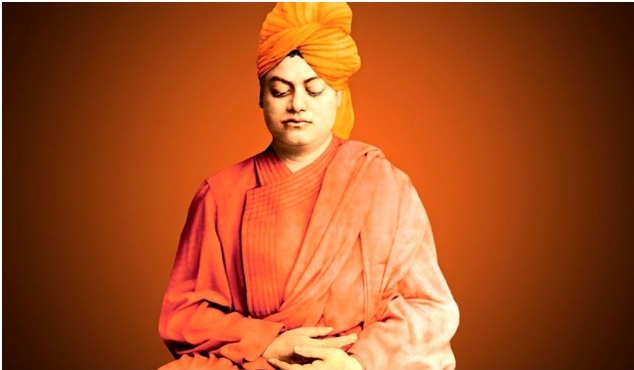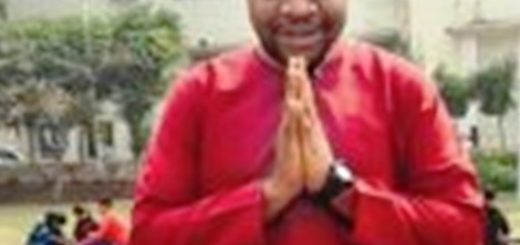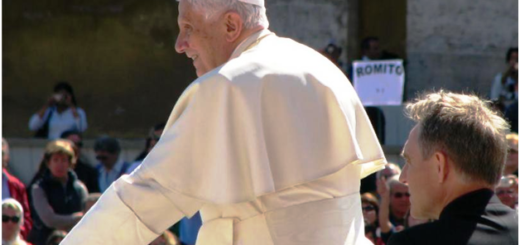Sin to call man a Sinner! An abiding message!

Kalyan Mitra, in the Statesman, Kolkata,January 28, 2017
(Note: “Never ever call man, the crown and glory of creation a sinner!” Vivekananda said it in another place. I quoted it many times. Here he is quoted as saying: “It is a sin to call man a sinner. Divinities on earth sinners? Man is God, he is Narayana” etc. the idea is identical. In any case this and other readings and research made a lot of impact on my thinking and search for truth in the last 82 years which led me to the conviction that there is no such thing called sin. Vivekanada lived only 39 years only to reach enlightenment, Jesus attained it in 30 years. Is there any hope for those who crossed 80 and still searching for truth?
This is only a small note necessitated by this article on Vivekananda, to provoke thinking. Even to cite all the various points in support of what is said above on sin and enlightenment, will take too long and to explain everything books have to be written. Those who have the time and patience I humbly suggest to download the speech of Vivekananda in Chicago (right now I am also in Chicago) to get an idea of the enormity of the subject we are dealing with.
His talks were on Sept.11, 15th and 27th 1893 at the Parliament of Religions in Chicago. Since it was so thrilling and uplifting I listened to him once again starting with: My dear Sisters and brothers (not brothers and sisters…) His identification with the poor, hungry, the “Daridra Narayans” for whom “work is worship” is beyond comprehension. It is comparable only to that of a Francis Pappa.
Now straight to the subject. The Herculean feat the Catholic church could perform in this world, it is said, is the success it achieved to indoctrinate, rather brain wash humanity with a sense of guilt and reduce it to the state of bonded labourers who spend the whole of their life time paying the interest for the life received (creation story) and property (paradise lost story). God the great Landlord imposed both on him unasked, not something man took from God as a loan for his survival.
Man didn’t ask any God to create him or give him a free will which is not free but made him act like dog on the leash to jump so far and no further or a defective knowledge to trap him at first use (eating the forbidden fruit to know more) for which he was punished with eternal damnation, not with a small scolding followed by fatherly advise, guidance and instruction on how not to get trapped by serpents or devils whom God himself crated to tempt him. Gospels speak of a God who never gives a snake or scorpion when a son asks his father for beard. Please, note all contradictions in all biblical stories.
Immediately after this the creators or inventors of this story make man say or call his fall(sin) a: “Happy Fault”(felix culpa) which merited for him a saviour (Jesus) who was to come millions of years later. The creators of this story (the clergy or the Brahmanic class which eats without sweating) are the exploiters and the rest are the exploited or bonded labourers here below.
It is about this origins of things Vayalar sang: “Man created religions, religions created Gods, and both together divided the mother earth and minds (divisive thinking) among themselves. Now all these stories are discredited with the advent of evolution or Big Bang theories. Still an awful lot of the brainwashed in Catholic church and all religions keep on believing in these stupid stories and go on paying the over lords and story tellers their tithe every week or month, without knowing that most of the enlightened people in the world today are living free in a religion-less or post-religious world.
Another hot topic the Church teaches in its philosophy and theology course in seminaries is that man’s free will is not free: that is, to will and act (velle et agree), the first motion both in the case of a good or bad action (motus primarius) the first push has to come God alone. Then how can Man be responsible for all his actions to commit any sin? God or grace which pushes him to act should be responsible for every one of his actions. Hence the saying: “Those whom he chose he has called them the sanctified and glorified.” Then where is the role for humans to get rewarded or punished because everything is God’s actions, not man’s?
If it is wrong to define human actions as sin and virtue what is the sensible alternative? None of us commit sin, which in popular parlance means offending God. Is it possible to offend God who is: Sachidananda ( Sat, Chith, ananda = essence, existence and Bliss)? At worst we make a lot of unintended blunders, mistakes because of our limitations. For example take the case of a child which learns to walk and falls down many times before it starts walking normally. Every time a child falls down we don’t say, it committed a sin. Similarly man will be making blunders (not sins) but mistakes until death. So all of us have to bear with all others when they fall from the normal standard. At best we offend our neighbours or please them. We don’t offend or please God because we just can’t do that.
How do we offend or please our neighbours? When we make use of others (pay less to a labourer to help ourselves than to help him), call it sin if you like and we do virtue when we try to be useful to others (when we pay a full day’s salary even to the one who came at the 11th hour.) So virtue and vice are in using or being useful to our neighbour. A more detailed explanation is given in my book, “Womb to Tomb”. It is in the same logic we say: “You love God only when you love your neighbour whom you see and not when you say, you love God whom you don’t see. All know you can’t fall in love with a beauty you haven’t seen. So to love God you have to love your neighbour, or you are a liar.
This is also what I heard some 50 years ago at Hyde park Corner from a Soap box orator. I had to be in London as assistant parish priest in a church near Crystal Palace for one summer month, And to verify what I studied about Hyde Park corner Debates, I had to visit the place and it was walking distance only. And Lo and behold one Soap box orator was lecturing away on the topic: SIN? (written in banner headlines and hung on his portable pulpit.) “What is sin? Who created it?” He roared and answered as in a confessional secret soft mild talk: “The Canon law of the Catholic Church created them all – venial, mortal, small sins big ones etc with definite punishments in purgatory or hell”. It was a treat – instructive and entertaining — to listen to his half hour oration. It simply left me flabbergasted, upset and unnerved and pushed me on to become a more committed seeker of truth.
If listening to him was the shock of my life, the study of Vivekananda and other intellectuals confirmed me in my belief that nothing is more absurd and ridiculous than to call man the crown and glory of creation a sinner. Excuse me for reducing a summer course on Sin to a few paras, written just to provoke thinking.
No one is bound to accept these views. But I will always remain a very receptive listener and leaner from every better informed persons. I have to and all of us have to learn even from a grave digger. Thus we all have to be seekers of truth till our last breath. james kottoor, editor).
Sisters and brothers of America’. These were the opening words of Swami Vivekananda as he addressed the opening session of the Parliament of Religions in Chicago. His speech was greeted with almost deafening applause from the 7000-strong audience.
He thanked Parliament as the “Mother of a Religion” which has taught the world both tolerance and universal acceptance (Vasudhaiva Kutumbakam). The profound concept of Advaita and Universal religion was presented to the West with the message — “As the different streams, having their sources in different places, all mingle their water in the sea”.
Swamiji had criticised those who believed that man was a sinner and he had proclaimed repeatedly the need for realisation of being and divinity that were already inherent in man. In his paper on Hinduism he had forcefully stated: “Yes, the Hindu refuses to call you sinners. Ye are the children of God, the sharers of immortal bliss, holy and perfect beings. Ye divinities on earth-sinners? It is a sin to call a man so; it is a standing libel on human nature.” Vivekananda believed that “Blood and sword are not for the Hindu whose religion is based on the law of love. Man is to become divine by realising the divine … Man is not travelling from error to truth but from lower truth to higher truth. Some of the very greatest of them (Rishis) were women”.
In a talk on “Religion not the crying need of India”, he told the audience, “Brethren of America the crying need of the East is not religion. We have more than enough religion; what they want is bread, but they are given stone. It is an insult to a suffering man dying of hunger to preach to him metaphysics … send missionaries to them to teach them metaphysical nonsense.”
At the plenary session, Swamiji was most eloquent when he said: “I came here to seek aid for my impoverished people, and I fully realised how difficult it was to get help for heathens from Christians in a Christian land. If anybody dreams of the exclusive survival of his own religion and the destruction of the others, I pity him from the bottom of my heart and point out to him that upon the banner of every religion will soon be written in spite of resistance ‘Help and not Fight. Assimilation and not Destruction. Harmony and peace and not Dissension”!
His presentation at the Parliament of Religions is of paramount significance in his plans for the regeneration of India. And the message is relevant to this day. He called for the setting up of centres of spirituality for moral, economic and social uplift of the people. Today this is the crying need for the self-seeking political leaders as well as the intelligentsia and the common people to reform themselves in serving the country selflessly, and also to rise and live up to the ideal of bahujan sukhayo bahugana hitaya.
The task of the leader is to work for the welfare of the poor, the Daridra Narayan and to harmonise religion and practical spirituality without fanaticism, selfishness, persecution, untouchability and corruption and to propagate honesty and integrity. India would become a much improved nation. He propagated ‘work as worship’. He wrote to Swami Akhandananda from America ‘work, work, work — I care for nothing else, work, work, work, even unto death. Those who are weak must make themselves great workers, great heroes. Every action that helps a being manifest its divine nature is good, and every action that retards is evil. To Rakhal (Swami Brahmananda) he wrote. ‘Far greater help must be given to the poor and downtrodden, the ignorant, let them be your God, Man is God, he is Narayana. Vivekananda was pragmatic and advocated that we have to bring technology from the West while they would learn spirituality from India.
Swamiji was most emphatic on the emancipation and education of women. He epitomized the Holy Mother Sarada Devi as the divine ideal of modern Indian womanhood as Shakti and Saraswati. It was with her blessings and inspiration that he finally decided to embark on his mission to the West. Swamiji forcefully said that only if Indian women are educated and treated with respect and reverence, India could move ahead. Deeply significant and particularly relevant are Swamiji's words of prophetic wisdom as manifest in his speeches at the Parliament of Religions and in his plan for campaigning in the midst of the quagmire of Indian society and polity. Significant too is his clarion call to “Arise, Awake and Stop Not Till the Goal is reached”. We the people of India have to respond to this call.
With considerable regret, Swami Vivekananda had once remarked that ‘Sometimes I feel a desire to sell the (Belur) Math and everything and distribute the money to the poor during the plague epidemic in Calcutta’. He told his disciple that “your duty is to save the poor and miserable, without distinction of caste and colour and you have no need to think about the results. Who serves Jiva serves God indeed.” He thus conveyed Sri Ramakrishna’s message — Shiva jnane Jiva seva (Serve all beings knowing them as Shiva).
Swamiji had told his disciple that true spirituality meant a feeling of misery and restlessness till no man or animal, remains hungry for a meal. Abiding by the teachings of Sri Ramakrishna he coined the motto of the Ramakrishna Mission as Aatmano Mokshartam Jagadhitaya cha (Strive for one’s spiritual liberation and do good to the world). Our leaders and our people have to live up to this ideal.

















Mind boggling, diturbing, convincing, meditational, rational, ideal, impracticable, realistic, aweful and awesome all at one and the same time. May God alone enlighten us.